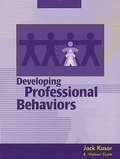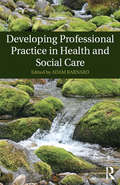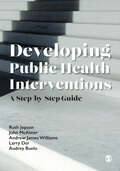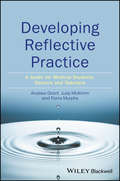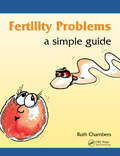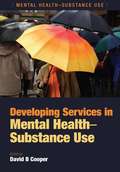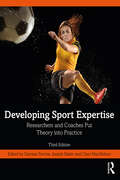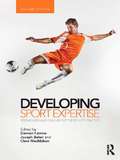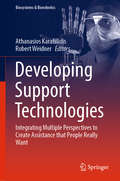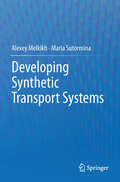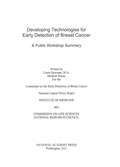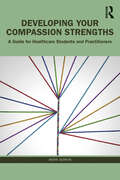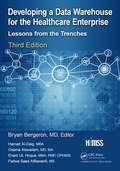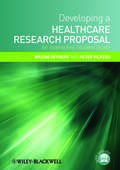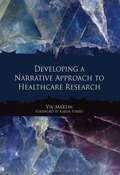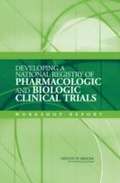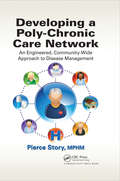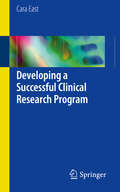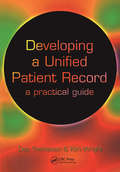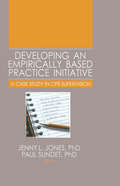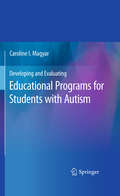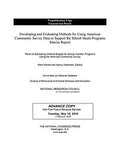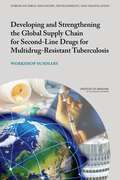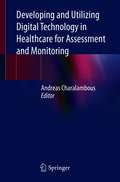- Table View
- List View
Developing Professional Behaviors
by E. Nelson Clark Jack KasarThis timely book provides a focused approach for developing a challenging yet vital and necessary area for professional success in health care practitioners -- the development of professional behaviors. It addresses the essential elements that are necessary to perform professionally in society, such as dependability, professional presentation, initiative, empathy, and cooperation. These behaviors are developed through the recognition of skills, practice, experience, role mentorship, and evaluative feedback. The issues of professional behavior are directed specifically toward the health care professional. Emphasizing the importance of these behaviors in students can only help to strengthen them for professional roles. This book utilizes case vignettes, structured learning activities and exercises, and self-reflection and evaluation techniques. It helps to define what professionalism means, and presents strategies to enhance its development. Features Professional Development Assessment. Case Vignettes, Activities, and Exercises. Structured Activities for Professional Behaviors.
Developing Professional Practice in Health and Social Care
by Adam BarnardAddressing the changing world of professionalism, this text combines theory, research and practice, using real case studies, to investigate the process of becoming professional. Mapping the journey from allied or associate practitioner positions through qualifying and into advanced practitioner status, it is a valuable companion for health and social care, social work and allied health students from the beginning of their studies. Developing Professional Practice in Health and Social Care is an accessible text, including case studies, reflective exercises and activities, chapter aims and summaries and further reading boxes throughout. It covers: the context for professional practice, including historical perspectives, policy and discussion of relevant competencies and frameworks the concept of professionalism, exploring what it means to be a professional values and ethics underpinning professional practice professional identity development, including formation and changes in identity professional practice in complex environments, paying particular attention to working in organisations becoming a critical and globally aware practitioner the role of evidence and knowledge in professional practice working with supervision. Maintaining a strong focus on the ethical dimensions of professional practice, this text emphasises how health and social care practitioners can contribute to social justice and challenge social exclusion.
Developing Public Health Interventions: A Step-by-Step Guide
by Ruth Jepson John McAteer Andrew James Williams Larry Doi Audrey BueloA highly practical guide to public health intervention development. This book has been developed to assist anyone involved with effective health promotion project design. It cuts through the complex theories and technical frameworks to provide a 6 step formula for creating effective and sustainable interventions. Key features Adopts a pragmatic approach that addresses barriers and challenges to project delivery Utilises the Six Steps in Quality Intervention Development framework - a unique model designed specifically to improve intervention planning Combines the theory and concepts behind intervention development with practical methods of delivery on the ground Includes detailed case studies that provide examples of how the six steps can be used for successful intervention design As the health needs of an increasingly globalised world continue to evolve and shift, effective planning and intervention work will only become more important. Written by leading researchers and experts who draw on a wealth of experience in the field, this book will be essential reading for any student, practitioner or policy maker requiring an understanding of practical intervention design.
Developing Public Health Interventions: A Step-by-Step Guide
by Ruth Jepson John McAteer Andrew James Williams Larry Doi Audrey BueloA highly practical guide to public health intervention development. This book has been developed to assist anyone involved with effective health promotion project design. It cuts through the complex theories and technical frameworks to provide a 6 step formula for creating effective and sustainable interventions. Key features Adopts a pragmatic approach that addresses barriers and challenges to project delivery Utilises the Six Steps in Quality Intervention Development framework - a unique model designed specifically to improve intervention planning Combines the theory and concepts behind intervention development with practical methods of delivery on the ground Includes detailed case studies that provide examples of how the six steps can be used for successful intervention design As the health needs of an increasingly globalised world continue to evolve and shift, effective planning and intervention work will only become more important. Written by leading researchers and experts who draw on a wealth of experience in the field, this book will be essential reading for any student, practitioner or policy maker requiring an understanding of practical intervention design.
Developing Reflective Practice: A Guide for Medical Students, Doctors and Teachers
by Judy Mckimm Fiona Murphy Andy GrantThe ability to reflect on practice is a fundamental component of effective medical practice. In a sector increasingly focused on professionalism and patient-centred care, Developing Reflective Practice is a timely publication providing practical guidance on how to acquire the reflective skills necessary to become a successful clinician. This new title draws from a wide range of theoretical and practical multidisciplinary perspectives to assist students, practitioners and educators in embedding reflection in everyday activities. It also offers structures and ideas for more purposeful and meaningful formal reflections and professional development. Developing Reflective Practice: Focuses on the developing practitioner and their lifelong learning and the development of professional identity through reflection Provides practical how-to information for students, practitioners and educators, including realistic case examples and practice-based hints and tips Examines and explains the theoretical and conceptual approaches to reflective practice, including its models and frameworks.
Developing Research in Primary Care
by Martin Williams Mike Saks Beverley HancockThe rapid development of NHS trusts is making unprecendented demands on those responsible for strategic planning and management for which many are unprepared. This manual is based upon the experience of those who have faced the questions and found the answers. It is intended for all those involved in Trust management. The questions are not all board-level strategic questions; some are quite mundane and managerial. However, the questions will have to be asked and the answers will determine what it is like to work within the organization, be one of its patients or a user of its services.
Developing Services in Mental Health-Substance Use
by David B. CooperMental health-substance use is a complex interrelation, with equally complex implications for individuals and their families, health professionals and society. Although its international recognition as an issue of critical importance is growing, clear guidance for professionals on mental health-substance use and its treatment is hard to find. The Mental Health-Substance Use series addresses this need, concentrating on concerns, dilemmas and concepts that impact on the life and well-being of affected individuals and those close to them, and the future direction of practice, education, research, services, interventions, and treatment. Having set the scene with the first book's Introduction, this second book in the series tackles service development: how to evaluate the current state from a firm knowledge base, plan and manage change to provide better services, and continue monitoring and evaluating them on an ongoing basis. The volumes in this series are designed to challenge concepts and stimulate debate, exploring all aspects of the development in treatment, intervention and care responses, and the adoption of research-led best practice. They are essential reading for mental health and substance use professionals, students and educators
Developing Sport Expertise: Researchers and Coaches Put Theory into Practice
by Joseph Baker Damian Farrow Clare MacMahonThe athlete development process spans from initial sport engagement to elite-level performance to effective career transition out of sport. This is a long and complicated process. Identifying and nurturing talent, fine-tuning sport skills, and maintaining high levels of performance over the course of a career requires many thousands of hours of training and, increasingly, the input and support of expert coaches and sport scientists. In this fully revised and updated new edition of the leading student and researcher overview of the development of sport expertise, a team of world-class sport scientists and professional coaches examine the fundamental science of skill acquisition and explore the methods by which science can be applied in the real-world context of sport performance. This book surveys the very latest research in skill acquisition, provides a comprehensive and accessible review of core theory and key concepts, and includes an innovative "Coach’s Corner" feature in each chapter, in which leading coaches offer insights from elite sport and critique contemporary practice in sport skill development. The third edition of Developing Sport Expertise will be invaluable reading for all researchers and students in the areas of expertise in sport, skill acquisition, motor control and development, sport psychology, or coaching theory and practice.
Developing Sport Expertise: Researchers and Coaches Put Theory into Practice, second edition
by Damian Farrow Clare MacMahon Joe BakerThe development of an athlete from basic performance to elite level of accomplishment is a long and complicated process. Identifying and nurturing talent, developing and fine tuning sport skills, and maintaining high levels of performance over the course of a career requires many thousands of hours of training and, increasingly, the input and support of expert coaches and sport scientists. In this fully revised and updated new edition of the leading student and researcher overview of the development of sports expertise, a team of world-class sport scientists and professional coaches examine the fundamental science of skill acquisition and explore the methods by which science can be applied in the real-world context of sport performance. This book surveys the very latest research in skill acquisition, provides a comprehensive and accessible review of core theory and key concepts and includes an innovative ‘Coaches Corner’ feature in each chapter, in which leading coaches offer insights from elite sport and critique contemporary practice in sport skill development. With new chapters offering more material on key topics such as instruction and observation and expert visual perception, the second edition of Developing Sport Expertise is invaluable reading for all researchers and students in the areas of?expertise in sport, skill acquisition, motor control and development, sport psychology, or coaching theory and practice.
Developing Support Technologies: Integrating Multiple Perspectives to Create Assistance that People Really Want (Biosystems & Biorobotics #23)
by Athanasios Karafillidis Robert WeidnerThis book shows the advantages of using different perspectives and scientific backgrounds for developing support technologies that are integrated into daily life. It highlights the interaction between people and technology as a key factor for achieving this integration and discusses relevant methods, concepts, technologies, and applications suitable for interdisciplinary exchange and collaboration. The relationship between humans and technology has become much more inclusive and interdependent. This generates a number of technical, ethical, social, and practical issues. By gathering contributions from scholars from heterogeneous research fields, such as biomechanics, various branches of engineering, the social sciences, information science, psychology, and philosophy, this book is intended to provide answers to the main questions arising when support technologies such as assistance systems, wearable devices, augmented reality, and/or robot-based systems are constructed, implemented, interfaced and/or evaluated across different application contexts.
Developing Synthetic Transport Systems
by Alexey Melkikh Maria SutorminaUnderstanding the general laws of an effective system for the transport of substances in cells is an important goal of systems and synthetic biology and will help us to answer why the transport subsystem of a cell is arranged as it is. In addition, the construction of models for optimizing transport systems is of considerable importance in the early stages in the development of a functioning protocell. The aim of this book is to describe the latest techniques for the calculation of the optimal parameters of the transport subsystem of a cell at its maximum efficiency. The book will describe linear and nonlinear programming, dynamic programming, game theory for models of ion transport in different types of cells (e.g. mammalian cells, bacteria, plants and fungi).
Developing Technologies for Early Detection of Breast Cancer: A Public Workshop Summary
by Institute of Medicine National Research CouncilThe National Academies Press (NAP)--publisher for the National Academies--publishes more than 200 books a year offering the most authoritative views, definitive information, and groundbreaking recommendations on a wide range of topics in science, engineering, and health. Our books are unique in that they are authored by the nation's leading experts in every scientific field.
Developing Your Compassion Strengths: A Guide for Healthcare Students and Practitioners
by Mark DurkinThis practical book suggests ways in which healthcare students and practitioners can develop their compassion strengths. Discussing what compassion is and means, it includes a new compassion strength model and a series of exercises the reader can use for reflecting on and developing their practice. A hallmark of healthcare practice is compassion, yet there is a lack of understanding as to what compassion is and how it can be developed in practice. The book begins with the challenge of defining compassion, particularly looking at healthcare contexts and making links between self-care and caring for others. It then presents a new, evidence-based holistic model that brings together key elements of compassion for self and other, along with a scale that readers can measure themselves against. Identifying eight strengths "self-care, connection, communication, competency, empathy, interpersonal skills, character, and engagement" Durkin provides the theoretical background to each, accompanied with suggestions for practice and reflective activities. It ends with a selection of vignettes that readers can use to try out their strengths. Highlighting the concept of compassion strengths, and compassion as a way of being, this is an essential read for healthcare students and practitioners, whether involved in direct patient care or management.
Developing a Data Warehouse for the Healthcare Enterprise: Lessons from the Trenches, Third Edition
by Mba Pmp Bryan P. Bergeron Hamad Al-Daig Fadwa Saad AlBawardi Md Ma Osama Alswailem Enam Ul Hoque CphimsThis third edition to the award-winning book is a straightforward view of a clinical data warehouse development project, from inception through implementation and follow-up. Through first-hand experiences from individuals charged with such an implementation, this book offers guidance and multiple perspectives on the data warehouse development process – from the initial vision to system-wide release. The book provides valuable lessons learned during a data warehouse implementation at King Faisal Specialist Hospital and Research Center (KFSH&RC) in Riyadh, Saudi Arabia – a large, modern, tertiary-care hospital with an IT environment that parallels a typical U.S. hospital. <P><P>This book also examines the value of the data warehouse from the perspectives of a large healthcare system in the U.S. and a corporate health services business unit. Special features of the book include a sample RFP, data warehouse project plan, and information analysis template. A helpful glossary and acronyms list are included.
Developing a Healthcare Research Proposal
by Peter Vickers Maxine OffredyAre you new to research and daunted by the idea of constructing your own research proposal? Then this is the book you need!This book and accompanying web resource will answer all your questions about healthcare research by introducing you to the concepts, theories and practicalities surrounding it. The aim of both the book and the web resource is to help you to write a good healthcare research proposal - which is the starting point for any would-be student researcher.The book takes a look at the theory of research, the core of the topic, but also provides practical help and advice along the way. It takes the reader through the stages of the research process from developing the question to communicating the findings, demystifying the process on the way. The web resource works alongside the book, supplementing and expanding on the chapters, giving you the ability to prepare your very own research proposal.Explains key concepts in a clear, easy to understand wayIncludes activities and scenarios for you to work through which will also increase your understanding of research and research proposalsEasily navigable web resource (www.researchproposalsforhealthprofessionals.com)Both book and website are arranged in the same order in which you would develop and write a research proposalWebsite includes downloadable research proposal template to complete step-by-step as you work through the book and web resource
Developing a Narrative Approach to Healthcare Research (Radcliffe Ser.)
by Viv MartinPatients' perspectives on their experiences of illness and treatment are increasingly valued by the medical profession as a source of information to enhance professional development, peer support and the quality of care provided. This book explores the development of an in-depth, relational and reflexive approach to narrative inquiry, drawing on counselling and arts-based approaches to researching accounts of illness. The significance of patient stories is explored through narrative research conversations with people whose personal accounts of a range of conditions provide powerful insights into the impact of illness on identity, life stories and the experience of patienthood. It offers suggestions for using narrative methods in medical education and practice to help professionals to both attend to patients' narratives and reflect on their own stories. Developing a Narrative Approach to Healthcare Research will be of interest to educators, practitioners, students and researchers in healthcare and the social sciences. 'I will recommend this book to my students; I hope other healthcare professionals will do the same and that some, like me, will go on to explore how narrative and story can be harnessed to both explore experience and to teach within healthcare.' - from the Foreword by Karen Forbes 'I would recommend this book to everybody who is involved in caring for people who suffer serious illness - whether they are professionals, family or friends. I also recommend it to social scientists and health professionals who want to conduct research in ways that capture the richness of peoples' lived experience.' - Kim Etherington, Professor of Narrative and Life Story Research, University of Bristol, UK.
Developing a National Registry of Pharmacologic and Biologic Clinical Trials: Workshop Report
by Institute of Medicine of the National AcademiesThe National Academies Press (NAP)--publisher for the National Academies--publishes more than 200 books a year offering the most authoritative views, definitive information, and groundbreaking recommendations on a wide range of topics in science, engineering, and health. Our books are unique in that they are authored by the nation's leading experts in every scientific field.
Developing a Poly-Chronic Care Network: An Engineered, Community-Wide Approach to Disease Management
by MPHM, Pierce StoryAlthough much has been achieved in care coordination and accountable care, healthcare leaders need additional, game-changing innovations to deal with constraints in clinical resources, care capacity, and cost that have not yet been fully addressed. This need for innovation is especially great in the care of the chronically ill: the most costly, hig
Developing a Successful Clinical Research Program
by Cara EastThis unique book is designed to help a medical team become a clinical research team. It includes practical information and tips for the initial stages of clinical research: building a team, negotiating a contract, developing a budget, and writing and improving a patient consent. Chapters describing the nuts and bolts of how to actually perform the study follow, including patient recruiting and retention, screening, follow-ups and handling monitor visits. Finally, there is discussion of the yearly reviews and disclosures and not just surviving, but acing, the all-important Food and Drug Administration audit.Clinical research moves medicine forward and is a necessary part of bringing any new therapy, device, or procedure into routine medical care. However, it can be costly and convoluted, and the methodologies of clinical research are not widely standardized. Decreasing some of the chaos present in American clinical research is the primary goal of this book. The second goal is to improve the understanding and education of those who enter clinical research, whether in the frontline work of the clinical research site, in the middleman companies who have a high turnover rate, at a research hospital or institution, or at medical corporations that depend on good clinical research to bring their products to market. The third reason is to standardize American clinical research and to remove some of the vagaries and inconsistencies in the field.Practical and user-friendly, Developing a Successful Clinical Research Program fills a need for a clear guide to developing and improving a first-class research program in any clinical setting.
Developing a Unified Patient-Record: A Practical Guide
by Kim Wright Deborah ThompsonThe introduction of the new General Medical Services contract for the payment and reward of general practice and GP practices will inevitably change the way in which primary care is delivered. This practical workbook aims to address how its implementation will work in practice. Written in the interactive Roy Lilley workbook style with think boxes hazard warnings tips and comment boxes it deals with the implications impact and implementation of the New Contract questioning the contract's impact on patients and the provision of services. It is an essential guide for general practitioners primary care managers practice staff and trainers; and for all those that have an involvement in primary care and the implementation of the new contract. GPs practices and PCOs need as much guidance as they can get - from the General Practitioners Committee the NHS Confederation and also from books such as this. The more advice that they can turn to and the earlier they can get the help they need the better. So I welcome Roy's book as a valuable contribution. The book is primarily an informative summary of the contract documents and a practical tool kit for putting the contract into action. I too want to see practice teams making the contract work and this book will help many of them to do so. John Chisholm in the Foreword
Developing an Empirically Based Practice Initiative: A Case Study in CPS Supervision
by Jenny L. Jones Paul SundetDeveloping an Empirically Based Practice Initiative documents practice techniques that were used during a three-year training/demonstration project for child welfare supervisors working in the frontlines of child protection services in the Southeastern United States. This unique book is a guide to combining research methodology with staff training to enhance the quality of evidence-based practice in the field. The book examines techniques that were used in training modules in four states, highlighting practice models and intervention outcomes from an evidence-based perspective.Developing an Empirically Based Practice Initiative includes details about the project from the federal perspective (The Children’s Bureau) and the operational implications at the Southern Regional Quality Improvement Center (SRQIC) level. The book examines the issues of providing technical research assistance to child welfare agencies and the complexities of cross-site evaluation with different political jurisdictions. Developing an Empirically Based Practice Initiative examines: The Children’s Bureau discretionary grant program the relationship between child welfare workers’ career plans and their abilities to accomplish core work tasks secondary traumatic stress (STS) in child protective services workers methods for monitoring and evaluating child welfare supervisors clinical decision-making as a tool for building effective supervision skills the use of outcome data for decision-making the development and implementation of the Tennessee project the use of “360-degree” evaluations to improve clinical skill development the Intervention Design and Development modelDeveloping an Empirically Based Practice Initiative is an invaluable aid for social work practitioners, child welfare workers, case managers, and supervisors, and for social work academics and students.
Developing and Evaluating Educational Programs for Students with Autism
by Caroline I. MagyarRecent years have witnessed a marked increase both in the number of children diagnosed with autism spectrum disorders (ASDs) and those placed alongside their typically developing peers in general education classrooms. These events bring with them a plethora of challenges, particularly in the areas of program design and educational practices. Developing and Evaluating Educational Programs for Students with Autism offers systematic, evidence-based guidelines--as well as tools, checklists, and other resources--for creating effective learning environments for students across the autism spectrum and the grade span. Planning, development, implementation, and continuous evaluation are examined in detail in this practical volume, which features: An overview of the ASDs, with an emphasis on effective educational practice.In-depth discussion of the ASD Program Development and Evaluation Protocol.A staff training model for personnel working with students with ASD.A detailed framework for student support teams and family-school collaboration.Specific guidelines for conducting needs assessments and student evaluations.* Case examples of applications of the protocol on the program, school, and regional levels. Developing and Evaluating Educational Programs for Students with Autism is a uniquely rigorous and thorough reference benefiting school psychologists and special education professionals as well as those in allied educational and mental health fields, including clinical child, school, and developmental psychologists, psychiatrists, and other professionals working with children with autism.
Developing and Evaluating Methods for Using American Community Survey Data to Support the School Meals Programs: Interim Report
by National Research Council of the National AcademiesThe National School Lunch Program and the School Breakfast Program, administered by the Food and Nutrition Service of the U.S. Department of Agriculture (USDA), are key components of the nation's food security safety net, providing free or low-cost meals to millions of school-age children each day. Under the most commonly adopted provisions, USDA reimburses districts for meals served on the basis of data collected in a "base year
Developing and Strengthening the Global Supply Chain for Second-Line Drugs for Multidrug-Resistant Tuberculosis
by Institute of Medicine Forum on Drug Discovery, Development, and Translation Anne B. Claiborne Board on Health Sciences Policy Rebecca A. English Rita S. Guenther Anna NicholsonTo effectively treat patients diagnosed with drug-resistant (DR) tuberculosis (TB) and protect the population from further transmission of this infectious disease, an uninterrupted supply of quality-assured (QA), second-line anti-TB drugs (SLDs) is necessary. Patients diagnosed with multidrug-resistant tuberculosis (MDR TB)--a disease caused by strains of Mycobacterium tuberculosis (M.tb.) resistant to two primary TB drugs (isoniazid and rifampicin)--face lengthy treatment regimens of 2 years or more with daily, directly observed treatment (DOT) with SLDs that are less potent, more toxic, and more expensive than those used to treat drug-susceptible TB. From 2000 to 2009, only 0.2-0.5 percent of the estimated 5 million MDR TB cases globally were treated with drugs of known quality and in programs capable of delivering appropriate care (Keshavjee, 2012). The vast majority of MDR TB patients either died from lack of treatment or contributed to the spread of MDR TB in their communities. A strengthened global supply chain for SLDs could save lives by consistently delivering high quality medicines to more of the people who need them. This public workshop explored innovative solutions to the problem of how to get the right SLDs for MDR TB to people who critically need them. More specifically, the workshop examined current problems and potential opportunities for coordinated international efforts to ensure that a reliable and affordable supply of high-quality SLDs is available. Developing and Strengthening the Global Supply Chain for Second-Line Drugs for Multidrug-Resistant Tuberculosis: Workshop Summary covers the objectives of the workshop, which were to review: -To what extent and in what ways current mechanisms are or are not effectively accomplishing what is needed, including consideration of bottlenecks. -The advantages and disadvantages of centralization in the management of the global drug supply chain, and potential decentralized approaches to improve operations of the supply chain. -What can be learned from case studies and examples from other diseases (e.g., the Affordable Medicines Facility-malaria (AMFm) and the U.S. President's Emergency Plan for AIDS Relief [PEPFAR]) - The current allocation of responsibilities and roles of the private (including industry and nonprofit public health organizations) and public sectors, and examination of opportunities for enhancing and optimizing collaboration -Identification of potential innovative solutions to the problem
Developing and Utilizing Digital Technology in Healthcare for Assessment and Monitoring
by Andreas CharalambousThis book discusses the current trends in nursing and healthcare in relation to the integration of information technological interventions across the care continuum. The use of such interventions in healthcare has increased rapidly in recent years, partly due to the rise in technological gadgets/applications used in daily routines (e.g. actigraphy bracelets, smartphones) and their unique properties that can be utilized in assessing, monitoring and managing a patient’s condition remotely. This book highlights the areas and the ways in which these interventions can facilitate patient assessment and monitoring and complement conventional treatments in the management of disease-induced or treatment-induced side effects. Furthermore, the book describes the development of such interventions and examines how they are designed to promote adherence and acceptance by the user. To this end, the book also discusses the need for personalizing the technological experience according to the user’s preferences and needs. Drawing on the latest studies in these areas, it not only provides suggestions for undertaking research in this context, but also offers insights into how these technologies impact patients’ clinical outcomes. Lastly, it addresses the challenges of utilizing such technologies and future directions. Providing multiple perspectives on the topic, the book appeals to a wide range of readers, including nurses, clinicians, researchers, technology experts and students, making them familiar with a broad selection of technological interventions and their application in clinical practice. Moreover, it highlights the factors that need to be considered in the development (and testing) of future interventions, in particular in nursing, and provides inspiration for future studies.
